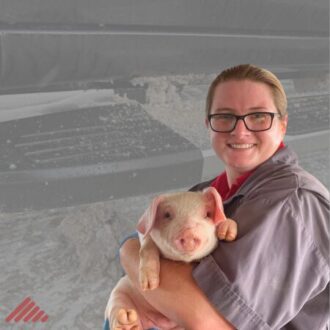Today’s pig farms have access to a wide range of technologies—from mobile phones to specialized software—that help us track production and communicate more effectively. But even with these tools, communication gaps still exist. We often assume that because employees record and analyze the data, everyone on the farm understands what it means.
While pig caretakers are responsible for keeping accurate records in the barns, it doesn’t necessarily mean they understand what’s happening with the pigs they manage—or with the rest of the operation. With the volume of messages and updates we receive daily, staying organized and on the same page is a challenge.
One simple, effective way to improve team communication and overall awareness is through the use of whiteboards. A whiteboard makes key information visible to everyone on the team—at a glance.
Here are 10 practical tips for using whiteboards in your operation:
- Visual
Keep the information easy to read and interpret. Use tables, charts, or graphs to help convey data quickly and clearly. - Accessible
Post the whiteboard in a high-traffic area where your team gathers—such as the office, shop, or breakroom—so it becomes part of their daily routine. - Simple
Stick to the essentials: mortality, inventory, pig movements, market loads, etc. The goal is to promote awareness and quick decision-making without needing to wait for closeouts. - Comparable
Update the information weekly but leave previous weeks visible. This helps the team see trends, understand changes, and project future performance based on past results. - Actionable
Use the board to spark team discussions. Encourage input on what might be causing issues and what actions can be taken immediately to improve outcomes. - Foster Collaboration
When teams are divided by roles—nursery, finisher, marketing—it’s easy to get siloed. A shared board fosters a sense of unity, responsibility, and appreciation for what other team members are doing. - Track Maintenance
Maintenance requests often get lost in the shuffle. Listing them on the board adds accountability and ensures follow-up. - Movement Schedule
Post key movement dates—like weaning, market loads, washing, or barn setup—to improve planning and time management. - Team Schedule
Share weekly schedules and responsibilities. This improves efficiency and helps identify where extra support may be needed. - Set Clear Expectations
Review performance goals—both individual and team—regularly. These should include production targets, weekly working hours, and overtime to help align efforts and reduce surprises.
Technology is powerful, but nothing replaces clear, visible communication. A whiteboard keeps the entire team aligned, focused, and working toward the same goals. It’s a low-cost tool that can help solve big organizational challenges—and build a stronger, more engaged team.











